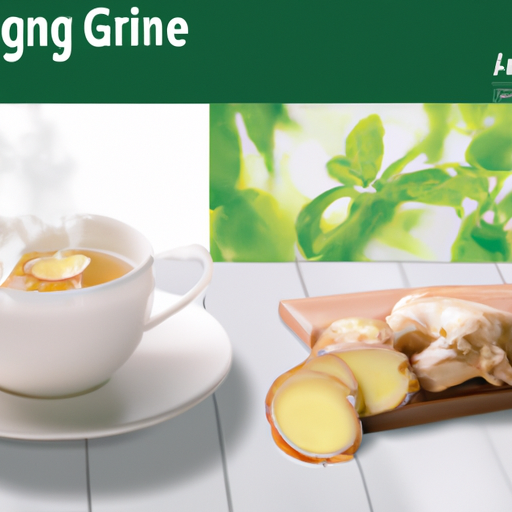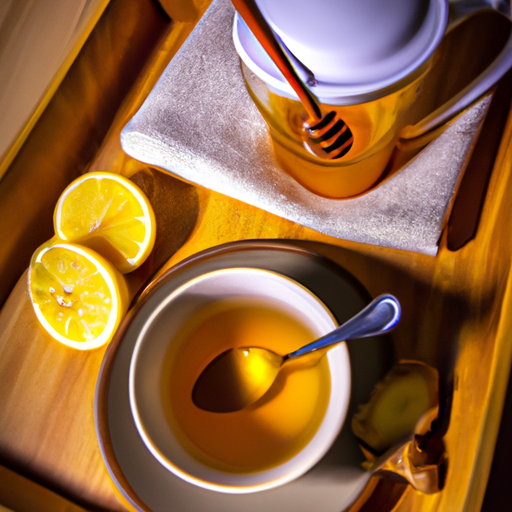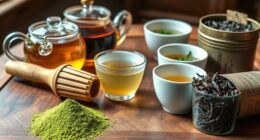As a person who has received a diagnosis of pancreatitis, I am aware of the intense pain and limitations that come with this condition. Pancreatitis involves inflammation of the pancreas, resulting in symptoms like severe stomach pain, nausea, and vomiting. While traditional treatments like pain relief and enzyme therapy can provide relief, many individuals are also curious about incorporating natural remedies like adjusting their diet and lifestyle.
One such remedy that has gained popularity in recent years is ginger tea. In this article, I will explore the question: is ginger tea good for pancreatitis? I will examine the scientific evidence behind ginger’s potential benefits, as well as any risks or precautions that those with pancreatitis should be aware of.
Before we dive into the specifics of ginger tea and pancreatitis, it’s important to understand the role of inflammation in this condition. Inflammation is the body’s natural response to injury or infection, but in pancreatitis, the inflammation becomes chronic and can lead to damage to the pancreas over time. This damage can result in a range of complications, from malabsorption of nutrients to the development of pancreatic cancer.
Therefore, reducing inflammation is a key goal in managing pancreatitis. Ginger has been shown to have anti-inflammatory properties, which is why it is often recommended as a natural remedy for a range of conditions, from arthritis to migraines. But does this mean that ginger tea is good for pancreatitis? Let’s find out.
Key Takeaways
- Ginger tea is a popular natural remedy for pancreatitis due to its anti-inflammatory properties.
- It contains compounds called gingerols and shogaols, which have anti-inflammatory and antiemetic properties.
- Other foods and drinks that may help with pancreatitis include turmeric, green tea, and probiotics.
- Incorporating ginger tea into a daily routine can provide various health benefits and a warm, comforting drink, but it is important to consult with a healthcare provider before incorporating it into your diet as it may cause stomach upset or interfere with certain medications.
What is Pancreatitis?
Pancreatitis is a painful inflammation of the pancreas that can be caused by a variety of factors, including excessive alcohol consumption or the presence of gallstones.
The pancreas is an important organ that produces digestive enzymes and hormones such as insulin, which helps regulate blood sugar levels.
When the pancreas becomes inflamed, it can lead to a range of symptoms such as severe abdominal pain, nausea, vomiting, and fever.
To diagnose pancreatitis, doctors may perform blood tests to measure levels of pancreatic enzymes, as well as imaging tests such as a CT scan or MRI.
Treatment for pancreatitis typically involves hospitalization and supportive care, such as pain management, IV fluids, and nutritional support.
In more severe cases, surgery may be necessary to remove damaged tissue.
It’s important to address the underlying causes of pancreatitis, such as avoiding alcohol or undergoing gallbladder surgery, to prevent further inflammation and damage to the pancreas.
Inflammation plays a critical role in the development of pancreatitis, as it can cause damage to pancreatic tissue and lead to the release of digestive enzymes into the surrounding tissue.
This can result in further inflammation and damage to the pancreas, leading to a cycle of worsening symptoms.
Understanding the role of inflammation in pancreatitis is important for developing effective treatments and preventing further complications.
The Role of Inflammation in Pancreatitis
Ah, inflammation – the pesky culprit behind so many health woes. In the case of pancreatitis, inflammation plays a critical role in the development and progression of the disease. When the pancreas becomes inflamed, it can cause damage to the organ and surrounding tissues. This can lead to a variety of symptoms such as severe abdominal pain, nausea, and vomiting.
Inflammation management is necessary to promote pancreatic health and prevent further damage to the organ. There are several ways to manage inflammation in pancreatitis. One of the most effective ways is through diet modification. A diet rich in fruits, vegetables, and whole grains can help reduce inflammation in the body. Additionally, consuming foods that are high in omega-3 fatty acids, such as salmon and walnuts, can also help reduce inflammation.
Incorporating anti-inflammatory spices, such as ginger, into the diet can also provide relief. In the subsequent section, we will explore the benefits of ginger tea for pancreatitis.
The Benefits of Ginger Tea
I’ve found that ginger tea has many benefits. One of these benefits is its anti-inflammatory properties. Studies have shown that ginger can help reduce inflammation in the body, which is particularly useful for those with pancreatitis.
Ginger tea can also aid in digestion by promoting the production of digestive enzymes and reducing bloating and gas.
Finally, ginger tea has been known to provide relief from nausea. This makes it a great option for those experiencing any discomfort related to their pancreatitis.
Anti-Inflammatory Properties
You’ll be pleased to know that ginger tea can help reduce inflammation in your pancreas. The anti-inflammatory properties of ginger make it a great addition to your diet if you suffer from pancreatitis.
While there are many alternative anti-inflammatory remedies available, ginger tea stands out for its effectiveness and ease of use. Ginger tea recipes are easy to find and simple to make at home. Adding ginger to your daily routine can have a positive impact on your overall health, but it’s important to consult with your healthcare provider before making any significant changes to your diet.
In addition to reducing inflammation, ginger tea can also aid in digestion, making it a great choice for those who experience digestive issues along with their pancreatitis.
Aid in Digestion
If you’re looking for a natural way to soothe your upset stomach, adding a dash of ginger to your diet could be just what you need. Ginger tea is known for its digestive benefits and has been used as a remedy for indigestion and bloating for centuries. A cup of ginger tea after a meal can help stimulate the digestive system, aiding in the breakdown of food and absorption of nutrients.
Brewing techniques can also influence the digestive benefits of ginger tea. To extract the most gingerol, the active compound responsible for the anti-inflammatory and digestive properties of ginger, it is recommended to steep freshly grated ginger in hot water for at least 10 minutes. Adding a slice of lemon or a teaspoon of honey can also enhance the flavor and provide additional benefits for digestion. With these simple brewing techniques, ginger tea can be a great addition to your diet to support digestive health.
Transitioning into the subsequent section about relief from nausea, ginger tea has also been found to be effective in reducing nausea and vomiting.
Relief from Nausea
Feeling queasy? A natural remedy for nausea and vomiting can be found by incorporating ginger tea into your diet. Ginger tea has been used for centuries to help with nausea relief, including morning sickness during pregnancy.
Here are three ways ginger tea can help alleviate nausea:
-
Anti-inflammatory properties: Ginger contains compounds called gingerols and shogaols which have anti-inflammatory properties. This helps to soothe the stomach lining and reduce inflammation, which can help with nausea.
-
Antiemetic properties: Ginger has also been shown to have antiemetic properties, which means it can help to prevent vomiting. This can be particularly beneficial for those undergoing chemotherapy or experiencing motion sickness.
-
Digestive benefits: Ginger can also help to improve digestion by increasing the production of digestive enzymes. This can help to break down food more effectively and reduce the chances of experiencing nausea or vomiting.
While ginger tea can be a helpful natural remedy for nausea relief, it’s important to note that it may not be suitable for everyone. In the next section, we’ll discuss potential risks of consuming ginger tea.
Potential Risks of Ginger Tea
Beware of the potential risks of ginger tea, as it may cause stomach upset or interfere with certain medications. While ginger tea is generally safe for consumption, it may lead to adverse effects in some individuals.
Ginger tea risks include heartburn, bloating, and diarrhea. In rare cases, some people may experience an allergic reaction to ginger, which can cause skin rashes, swelling, and difficulty breathing. Furthermore, ginger may interact with blood-thinning medications, such as aspirin and warfarin, and increase the risk of bleeding.
Despite the potential drawbacks of ginger, it can still be incorporated into your diet in a safe and healthy way. One way to do so is by adding small amounts of fresh ginger to your meals, such as in stir-fries, soups, and marinades. You can also steep fresh ginger slices in hot water for a few minutes to make ginger tea and enjoy its health benefits.
As with any dietary change, it’s important to consult with your healthcare provider before incorporating ginger tea into your diet, especially if you have a medical condition or take medication.
How to Incorporate Ginger Tea into Your Diet
So you think you’re too cool for ginger tea? Think again, because incorporating this spicy elixir into your diet is easier than you think. Here are some ways to enhance your ginger tea experience:
| Add-ins | Benefits | How-to |
|---|---|---|
| Lemon juice | Boosts immunity | Squeeze fresh lemon juice into your ginger tea |
| Honey | Soothes throat and cough | Add a spoonful of honey to your ginger tea |
| Cinnamon | Regulates blood sugar levels | Sprinkle cinnamon powder into your ginger tea |
Ginger tea is not only a tasty beverage, but it also provides various health benefits. In addition to its potential benefits for pancreatitis, ginger tea has been shown to improve digestion, reduce inflammation, and boost immunity. Drinking ginger tea can also help alleviate nausea and vomiting, making it a great option for those undergoing chemotherapy or experiencing motion sickness. By incorporating ginger tea into your daily routine, you can reap these benefits and enjoy a warm and comforting drink.
Other foods and drinks that may help with pancreatitis include turmeric, green tea, and probiotics.
Other Foods and Drinks That May Help with Pancreatitis
You can benefit from incorporating other foods and drinks such as turmeric, green tea, and probiotics into your diet to help manage your pancreatitis. Herbal supplements like turmeric have anti-inflammatory properties that can reduce inflammation in the pancreas.
Additionally, green tea is rich in antioxidants that can help protect the pancreas from further damage. Probiotics, on the other hand, can improve gut health and reduce inflammation in the pancreas.
Hydration is also essential in managing pancreatitis. Drinking plenty of water, coconut water, and clear broths can help prevent dehydration and reduce inflammation.
In addition, following a low-fat diet can help take the stress off the pancreas, allowing it to heal faster. Incorporating these foods and drinks into your diet can support your pancreas and reduce the risk of complications.
In the next section, we’ll discuss the foods and drinks to avoid with pancreatitis.
Foods and Drinks to Avoid with Pancreatitis
Avoiding certain foods and drinks is crucial when managing pancreatitis, as a study found that up to 70% of acute pancreatitis cases are caused by alcohol consumption or gallstones. To prevent pancreatitis complications, dietary restrictions are necessary.
Here are three foods and drinks that should be avoided:
-
Alcohol: Alcohol is one of the leading causes of pancreatitis, and it can worsen the condition if consumed during recovery. It’s essential to avoid alcohol completely to prevent further damage to the pancreas.
-
Fatty Foods: High-fat foods can cause the pancreas to work harder, leading to inflammation and pain. Therefore, it’s recommended to avoid foods such as fried foods, fatty meats, and dairy products with high-fat content.
-
Sugary Foods: Sugar can cause inflammation and increase the risk of developing type 2 diabetes, which can worsen pancreatitis. As a result, it’s essential to avoid sugary foods such as candy, sodas, and baked goods.
By avoiding these foods and drinks, individuals with pancreatitis can help manage their condition more effectively. However, it’s important to note that dietary restrictions alone don’t guarantee complete recovery. Therefore, it’s crucial to work with a healthcare professional to develop a comprehensive treatment plan that includes lifestyle changes that may help with pancreatitis.
Lifestyle Changes That May Help with Pancreatitis
I’d like to discuss some lifestyle changes that may help with managing pancreatitis.
Firstly, quitting smoking is essential as it’s a known risk factor for developing pancreatitis and can worsen symptoms.
Secondly, limiting alcohol intake is crucial as excessive alcohol consumption can cause pancreatitis and aggravate existing conditions.
Lastly, exercising regularly has been shown to improve pancreatic function and reduce inflammation in the pancreas.
These changes may not only help manage symptoms but also improve overall health.
Quit Smoking
If you’re a smoker, kicking the habit is a crucial step in managing your pancreatitis and improving your overall health. Smoking not only increases your risk of developing pancreatitis, but it can also worsen the condition if you already have it.
In fact, studies have shown that smokers with acute pancreatitis are more likely to experience complications and longer hospital stays. Quitting smoking may seem daunting, but there are resources available to help you such as nicotine replacement therapy, counseling, and support groups.
To successfully quit smoking, consider these three alternative therapies:
-
Mindfulness meditation: This technique can help reduce stress and anxiety, which are common triggers for smoking.
-
Acupuncture: This ancient Chinese practice has been shown to reduce nicotine cravings and withdrawal symptoms.
-
Hypnotherapy: This form of therapy can help change negative thought patterns and behaviors associated with smoking.
Limiting alcohol intake is another important lifestyle change that can benefit those with pancreatitis.
Limit Alcohol Intake
Limiting your alcohol intake is crucial in managing your pancreatitis and improving your overall health. Did you know that excessive alcohol consumption is the leading cause of pancreatitis, accounting for over 70% of cases?
When you limit your alcohol consumption, you reduce the risk of developing further pancreas damage and other related complications. It’s recommended that men shouldn’t consume more than two standard drinks per day, while women shouldn’t consume more than one.
It’s also important to note that even small amounts of alcohol can aggravate pancreatitis, so it’s best to avoid it altogether. Reducing your alcohol intake and developing healthy habits can bring about significant improvements in your overall health.
Consider replacing alcohol with healthier options such as water, herbal tea, or fresh juice. In addition, regular exercise can also help you manage your pancreatitis and improve your health. By engaging in moderate physical activity for at least 30 minutes daily, you can help reduce inflammation and improve your digestive system.
Remember, taking small steps towards a healthier lifestyle can significantly improve your overall well-being.
Exercise Regularly
To improve your health and manage pancreatitis, it’s important to regularly exercise for at least 30 minutes every day. Exercise can help reduce inflammation, improve blood flow and circulation, and promote healthy digestion. It can also help manage weight and decrease the risk of developing other health conditions, such as diabetes and heart disease.
In addition to regular exercise, stretching can also be beneficial for those with pancreatitis. Stretching can help improve flexibility, reduce muscle tension, and alleviate pain. It’s important to stay hydrated during exercise and stretching to prevent dehydration, which can worsen inflammation and digestion issues. Incorporating these practices into your daily routine can help improve your overall health and manage symptoms of pancreatitis.
As we’ve discussed the importance of exercise and stretching, the next step in managing pancreatitis is exploring medical treatments.
Medical Treatments for Pancreatitis
One effective treatment for pancreatitis is drinking ginger tea, which has anti-inflammatory properties that may help alleviate symptoms. However, it’s important to note that medical treatments for pancreatitis vary depending on the severity and underlying cause of the condition.
For example, in cases where the pancreatitis is caused by blockages in the pancreatic ducts, surgery may be necessary to remove the obstruction and improve the flow of pancreatic enzymes.
In addition to surgery, pain management and nutritional therapy are also important components of medical treatment for pancreatitis. Pain management may involve medications, such as nonsteroidal anti-inflammatory drugs (NSAIDs) or opioids, to help manage the discomfort associated with pancreatitis.
Nutritional therapy, on the other hand, focuses on providing the body with the nutrients it needs while also minimizing stress on the pancreas. This may involve dietary changes, such as reducing fat intake, or the use of pancreatic enzyme supplements to aid in digestion.
Ultimately, the best approach to treating pancreatitis will depend on the individual case and should be determined by a healthcare professional.
Frequently Asked Questions
Can ginger tea cure pancreatitis?
While alternative remedies like ginger tea have shown some benefits, there is currently no evidence to suggest that it can cure pancreatitis. It is important to consult with a healthcare professional for proper treatment.
What are the recommended amounts of ginger tea for pancreatitis patients?
As a pancreatitis patient, I find that consuming ginger tea in moderation can provide numerous benefits to my health. The recommended ginger tea dosage varies, but a safe amount is up to 4 cups per day. Ginger tea can help reduce inflammation and pain, boost digestion, and support overall wellness.
Are there any side effects of consuming ginger tea for pancreatitis patients?
As a pancreatitis patient, it’s important to be cautious when drinking ginger tea. Possible side effects include heartburn, diarrhea, and stomach upset. Consult with your healthcare provider about recommended ginger intake and any potential interactions with medications.
Can ginger tea be consumed along with other medications for pancreatitis treatment?
It’s essential to consult with your healthcare provider before taking ginger tea along with other medications for pancreatitis. Ginger tea interactions may vary depending on the dosage and the individual’s medical history.
Is there any scientific evidence to support the effectiveness of ginger tea in treating pancreatitis?
Ginger tea has been shown to reduce inflammation and improve digestive health in multiple studies. However, more research is needed to determine its specific effectiveness in treating pancreatitis.
Conclusion
In conclusion, while ginger tea may have potential benefits for those with pancreatitis, it shouldn’t be relied upon as a sole treatment method. It’s important to incorporate a variety of foods and drinks that may help with pancreatitis, such as fruits, vegetables, and lean proteins, while avoiding those that may exacerbate symptoms, such as alcohol and fatty foods. Lifestyle changes, such as quitting smoking and maintaining a healthy weight, may also improve outcomes for those with pancreatitis.
A hypothetical example of someone with pancreatitis who incorporates ginger tea into their diet may experience some relief from symptoms, such as nausea and inflammation. However, it’s important for them to work with their healthcare provider to develop a comprehensive treatment plan that includes not only dietary changes but also medical interventions as needed.
Overall, while ginger tea may have some potential benefits, it’s not a cure-all for pancreatitis and should be used in conjunction with other evidence-based treatments.










